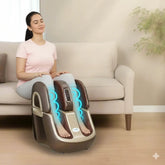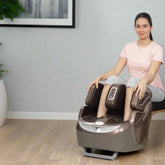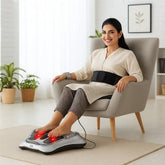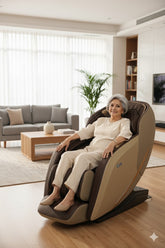In the chilly embrace of the night, the warmth of an electric heating pad can feel like a cozy sanctuary. Whether it's the aftermath of a strenuous day, the discomfort of chronic pain, or simply the desire for extra warmth, the appeal of drifting off to sleep with that comforting heat is undeniable. However, this common nighttime ritual prompts a crucial question: Is it OK to sleep with an electric heating pad on?
This blog delves into the heart of this query, unraveling the layers of safety, health implications, and expert advice. We'll explore the benefits and risks associated with electric heating pads, offering you insights and precautions to ensure your nighttime warmth doesn't turn into a morning concern. Join us as we navigate through the heat of the matter, illuminating a path towards safe and cozy nights.
So, Is it OK to sleep with an electric heating pad on?

Sleeping with an electric heating pad on can pose several risks and should be approached with caution. While electric heating pads are effective for relieving pain and providing warmth, their use during sleep comes with potential hazards
Potential Risks of Sleeping with Electric Heating Pads
- Burn Risk: There's a significant risk of burns, especially if the heating pad is left on a high setting. The body's ability to sense heat diminishes during sleep, increasing the risk of burns, sometimes severe, without the individual realizing it until after waking.
- Fire Hazard: Like any electrical device, heating pads carry a risk of malfunctioning, potentially leading to fires if left unattended or used improperly.
- Overheating: Extended exposure to heat can lead to overheating the body, disrupting sleep quality and potentially causing dehydration or heat-related illnesses.
- Electrical Safety: Faulty wiring or prolonged use can lead to electrical issues, posing a risk of electric shock or fire.
Heating Pad Safety Tips Before Sleeping
However, if one chooses to use a heating pad for comfort or pain relief before sleeping, there are safer alternatives and precautions to consider:
- Use auto-shutoff feature: Many modern heating pads come with an auto-shutoff feature that turns the pad off after a certain period, typically after 1-2 hours. This feature can significantly reduce the risk of burns and fire.
- Low heat settings: If the heating pad is to be used for extended periods, it should be set on a low heat setting to minimize the risk of burns and overheating.
- Time Limit: Instead of sleeping with the heating pad on, consider using it to warm the bed before sleep and then turning it off before you fall asleep.
- Heating pad covers: Use a cover for the heating pad to provide an additional layer between the skin and the pad, reducing the risk of burns.
- Consult a doctor: For those with medical conditions or who are pregnant, it's advisable to consult a healthcare provider before using a heating pad during sleep.
In summary, while it's generally not recommended to sleep with an electric heating pad on due to the risks of burns, fire, and overheating, taking appropriate precautions can mitigate some of these risks. Always prioritize safety and consider alternative methods for staying warm and managing pain during sleep.
If you’re looking for other effective options beyond heating pads, you can explore different types of body massagers and how they can help.
Are electric heating pads good for you?
Electric heating pads can offer several benefits when used appropriately and with caution. They are widely used for pain relief, relaxation, and providing warmth. Here's a breakdown of how they can be good for you:
Benefits of Using Electric Heating Pads
1. Pain Relief
- Muscle Relaxation: Heat therapy helps relax and loosen stiff muscles, reducing discomfort from muscle spasms, tension, or stiffness.
- Increased Blood Flow: Applying heat can increase blood circulation to the affected area, aiding in the recovery of muscles and tissues by providing them with more oxygen and nutrients while removing waste products.
- Chronic Conditions: People with chronic conditions such as arthritis, fibromyalgia, or menstrual cramps may find significant relief from the warmth and comfort that heating pads offer.
For leg pain relief, a foot & leg massager can be a safer alternative at night compared to heating pads.
Also Read: How to Find the Best Foot & Leg Massager?
2. Stress and Tension Reduction
-
Relaxation: The warmth from a heating pad can also promote relaxation, helping to reduce stress and anxiety. It can be particularly soothing for people who feel cold or have difficulty relaxing.
3. Improved Sleep
- Comfort and Warmth: For those who have trouble falling asleep due to cold or discomfort, a heating pad can provide the necessary warmth to help relax the body, making it easier to fall asleep.
4. Versatility and Convenience
- Targeted Relief: Electric heating pads can be applied to specific parts of the body where heat is needed the most, offering targeted relief.
- Ease of Use: They are relatively easy to use, portable, and can be adjusted for temperature to ensure comfort and safety.
To know more in detail, you can read our blog ‘Are Electric Heating Pads Good for You?’ where I explain everything thoroughly.
Safety Considerations
While electric heating pads can be beneficial, it's important to use them safely to avoid skin burns, overheating, or fire risks. Here are a few safety tips:
- Do not use on bare skin; always use a barrier like a cloth cover.
- Avoid using while sleeping or lying on the heating pad to prevent burns.
- Use heating pads with an automatic shut-off feature to prevent overheating.
- Regularly check for any damage or wear to the pad or electrical cords.
- Consult with a healthcare provider before use, especially if you are pregnant, have diabetes, or suffer from heart disease or skin conditions.
In conclusion, electric heating pads can be good for relieving pain, reducing stress, and providing comfort, as long as they are used with caution and proper safety measures are followed.
Worried about sleeping with a Heating Pad?
Get Free Expert Advice on Safe & Effective Pain Relief Options!
Do heating pads use much electricity?
The amount of electricity a heating pad uses depends on its wattage and the amount of time it's used. Most heating pads consume between 40 to 100 watts. To illustrate the electricity usage and its cost, let's do a calculation based on an average heating pad with a power rating of 60 watts:
Calculation Steps
- Calculate Daily Energy Consumption: This is done by multiplying the power consumption by the usage time. If we assume an average power consumption of 75 watts (midway between 50 and 100 watts) and a usage time of 3 hours per day, we get: Daily Energy Consumption=75W×3hours
- Convert Watts to Kilowatts: Since electricity is billed per kilowatt-hour, we need to convert the power consumption from watts to kilowatts (1 kW = 1000 W).
- Calculate Daily Cost: Multiply the daily energy consumption (in kWh) by the cost per kWh.
- Calculate Monthly Cost: Multiply the daily cost by the average number of days in a month (let's use 30 days for simplicity).
Let's proceed with these calculations to find out the cost of using a heating pad in INR.
Using a heating pad with an average power consumption of 75 watts for 3 hours a day, at a cost of electricity of ₹7 per kWh, results in a daily cost of approximately ₹1.58. Over the course of a month, this adds up to about ₹47.25.
This calculation suggests that the electricity usage of heating pads is relatively low, resulting in a modest cost in INR, especially when considering the comfort and benefits they provide.
Conclusion Is it OK to sleep with an electric heating pad on :
To wrap up the discussion on sleeping with an electric heating pad, it's clear that the practice comes with notable risks and should generally be avoided to ensure safety. The primary concerns revolve around the potential for burns, the risk of overheating, and the possibility of electrical hazards. These risks underline the importance of using heating pads cautiously and consciously, particularly when there's a risk of falling asleep.
Instead of using a heating pad throughout the night, individuals seeking relief from pain or the comfort of warmth should consider safer alternatives or strategies, such as warming the bed before sleep and then removing the pad, using wearable heat patches designed with safer temperature controls, or exploring other forms of pain relief and relaxation techniques suitable for overnight use.
In essence, while the benefits of heat therapy for pain relief and comfort are well recognized, ensuring the safe use of electric heating pads is paramount. By prioritizing safety and adhering to recommended guidelines for use, individuals can enjoy the advantages of heat therapy without compromising their well-being.











